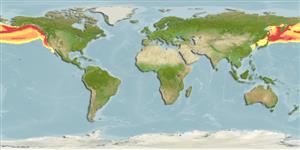Common names from other countries
Пластиножаберные (акулы и скаты) (sharks and rays) >
Lamniformes (Mackerel sharks) >
Lamnidae (Mackerel sharks or white shark)
Etymology: Lamna: From the Greek lamia, a large and voracious shark, originally from Lamia in Greek mythology, daughter of King Belos, who revenged the murder of her children by killing the children of others, and who behaved so cruelly that her face turned into a nightmarish mask. (See ETYFish); ditropis: di-, from dis (L.), in two; tropis (Gr.), keel, i.e., double-keeled, referring to the rudder-like projections on either side of tail. (See ETYFish).
More on authors: Hubbs & Follett.
Environment: milieu / climate zone / depth range / distribution range
экология
морской; мигрирует в океане (Ref. 51243); пределы глубины 0 - 650 m (Ref. 50550), usually 0 - 152 m (Ref. 55221). Boreal; 66°N - 22°N, 120°E - 115°W
North Pacific: Japan, Korea, and the Sea of Okhotsk to the Bering Sea and southward to southern California, USA (Ref. 247) and Baja California, Mexico (Ref. 9253).
Length at first maturity / Size / Вес / Возраст
Maturity: Lm ? range ? - 221 cm
Max length : 305 cm TL самец/пол неопределен; (Ref. 247); common length : 180 cm TL самец/пол неопределен; (Ref. 9988); наибольший вес (опубликованные данные): 175.0 kg (Ref. 9988); наибольший возраст (опубликованны данные): 27 годы (Ref. 119696)
колючие лучи спинного плавника (общее число) : 0; колючие лучи анального плавника: 0. First dorsal fin uniformly dark, no light rear tip; ventral surface of body white with dusky blotches (Ref. 247).
A coastal-littoral and epipelagic shark that prefers boreal to cool temperate waters, from the surface to at least 152 m, and is common in continental offshore waters but range inshore to just off beaches. Occurs singly or in schools or feeding aggregations of several individuals; feeds on fishes (Ref. 247). Seasonally migratory (following food prey) and segregate by age and sex where adults move further north than young (Ref. 58085). Ovoviviparous, embryos feeding on yolk sac and other ova produced by the mother (Ref. 50449). With up to 4 young in a litter (Ref. 247). Fast swimmer (Ref. 9988). Potentially dangerous but has never or seldom been implicated in human attacks (Ref. 247). Causes considerable damage to commercial catches and gear (Ref. 6885). Utilized fresh, dried or salted, and frozen; fins, hides and livers are also used, with fins having particular value; can be broiled and baked (Ref. 9988). Reported to attain at least 27 years of age and reach maximum depth of at least 792 m (in Ref. 119696).
Life cycle and mating behavior
Maturities | размножение | Spawnings | Egg(s) | Fecundities | личинки
Exhibit ovoviparity (aplacental viviparity), with embryos feeding on other ova produced by the mother (oophagy) after the yolk sac is absorbed (Ref. 50449). Litter size is up to 4 young (Ref. 247). Distinct pairing with embrace (Ref. 205).
Compagno, L.J.V., 1984. FAO Species Catalogue. Vol. 4. Sharks of the world. An annotated and illustrated catalogue of shark species known to date. Part 1 - Hexanchiformes to Lamniformes. FAO Fish. Synop. 125(4/1):1-249. Rome, FAO. (Ref. 247)
Статус Красного Списка МСОП (Ref. 130435)
CITES (Ref. 128078)
Not Evaluated
Угроза для людей
Traumatogenic
Использование человеком
рыболовство: не имеет хозяйственного значения; объект спортивного рыболовства: да
дополнительная информация
инструменты
Специальные отчеты
Скачать в формате XML
ресурсы в Интернет
Estimates based on models
Preferred temperature (Ref.
115969): 1.7 - 8.7, mean 4.7 (based on 832 cells).
Phylogenetic diversity index (Ref.
82804): PD
50 = 0.7813 [Uniqueness, from 0.5 = low to 2.0 = high].
Bayesian length-weight: a=0.00933 (0.00405 - 0.02151), b=3.04 (2.84 - 3.24), in cm Total Length, based on LWR estimates for this (Sub)family-body shape (Ref.
93245).
Trophic level (Ref.
69278): 4.5 ±0.80 se; based on food items.
устойчивость к внешним воздействиям (Ref.
120179): очень низкий, минимальное время удвоения популяции более 14 лет (Fec=4).
Fishing Vulnerability (Ref.
59153): High vulnerability (59 of 100).
